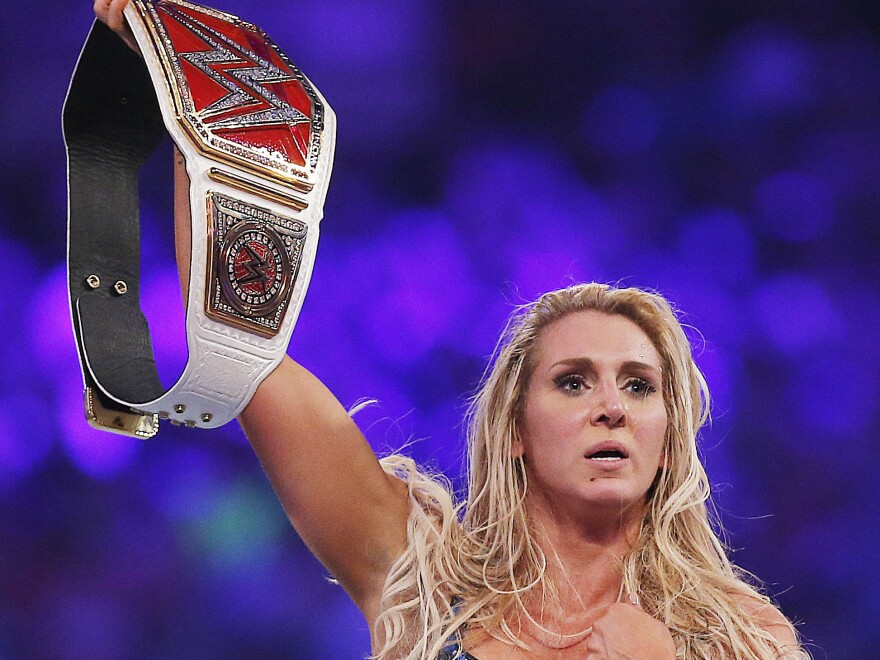In July 2015, World Wrestling Entertainment executive Stephanie McMahon called for better, more important roles for women in professional wrestling.
Invoking the success of the U.S. women's soccer team, Ronda Rousey, Holly Holm and Miesha Tate in the UFC and tennis stars Serena and Venus Williams as proof of the growing clout of women's sports, McMahon called for changing the "Divas" (women's) division of pro wrestling. She said, "there is a revolution in women sports happening right now. ... I want this revolution here in WWE."
The video below picks up right after McMahon announced her envisioned revolution. In it, she introduces new female characters — which means more camera time for the women and more attention for their storylines.
Nearly eight months later, during Sunday night's WrestleMania, WWE took another step in the revolution by announcing a new championship — well, a new name anyhow. With much fanfare, WWE unveiled the rebranded "divas" championship as the women's championship.
"The term 'divas' fit their female characters back in the day when the product was not as child-friendly, with women competing in matches such as bra and panties matches," Jack White, a London-based TV reviewer and reporter for the website Diva Dirt, told NPR in an email. He said WWE's changes are "absolutely huge."
In an article for the Players Tribune, a website that gives sports insiders a platform to tell their stories in their own words, McMahon explained the significance of the changes:
"Our female performers are world-class athletes, actors, public speakers and philanthropists. They're role models, inspiring and empowering women and girls to be confident and strong. They dedicate themselves to WWE, achieve great success and earn the same respect as their male counterparts.
"Therefore, from this point forward, all of our performers – male and female – will be known as 'Superstars.' "
This shift is the latest step in a social-media movement created by pro wrestling fans called #GiveDivasAChance, which demanded dynamic, more developed roles for female performers in the dramas of pro wrestling. The movement has been gaining momentum — in February #GiveDivasAChance trended on Twitter for three days — and the WWE has been paying attention. Female performers are no longer just decorations for the men's matches.
"Now the WWE measure their female athletes on their skill in the ring, rather than their looks," White said. "The girls are now given the chance to prove that their matches aren't blink-and-you'll-miss-it bathroom breaks, they are unmissable events."
The A.V. Club described Sunday night's WrestleMania women's championship match as "urgent, exciting, and relevant," calling it "the type of match that has the potential to singlehandedly change the course of women's wrestling."
While the WWE women are still scantily clad (so are the men) the programming is no longer geared as heavily toward the male gaze. The idea is to put less focus on the women's bodies and more focus on their abilities, character storylines and charisma.
CBS said the women's championship may have been "the match of the night" and that the wrestlers "put together a tremendous performance with awesome near falls, great spots outside the ring and some interesting submission combinations."
But as Vocativ wrote earlier this year, WWE is still struggling to reconcile its history of portraying woman in primarily sexual contexts, as evidenced by a recent appearance from one of WWE's biggest stars, Dwayne "The Rock" Johnson. The article read:
"Part of Johnson's appearance involved an extended bit with Lana, another of the company's young female talents, which consisted of a rambling monologue about an apparent sexual encounter the two had last year. Even when Rusev, Lana's fiancee both in storyline and reality, arrived on the scene The Rock continued to gleefully recall their X-rated antics, despite her obvious discomfort."
WWE's decisions to add more female performers to its roster and strike "diva" from its vernacular helps put male and female WWE performers on more equal footing, but it's also good for business.
In an interview last week with ESPN's Hannah Storm, McMahon said, "Our fans want to see our female athletes positioned the same as our men."
Copyright 2020 NPR. To see more, visit https://www.npr.org.


